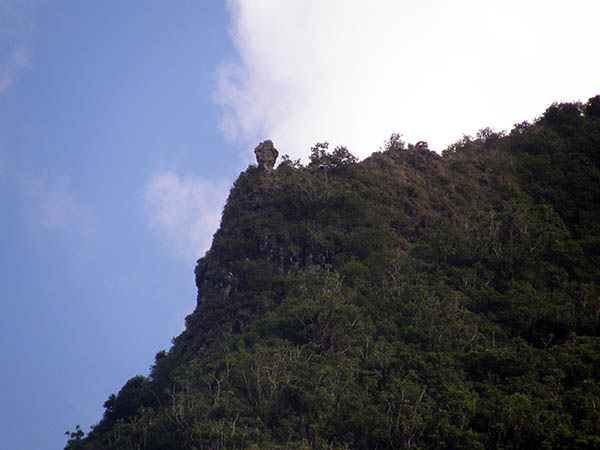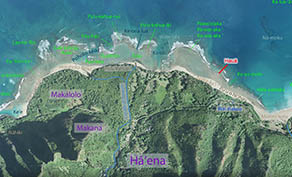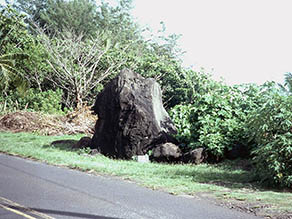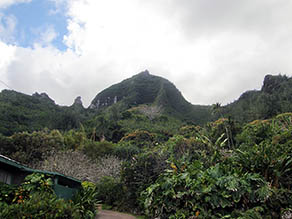 |

Pōhaku-a-Kāne, perched atop the ridge, keeps
an eye on Hā‘ena.
"There are two places on
this island that have Menehune names and have names given by other
people,"
says Carlos. "One is a rock the Kāne people call "Pōhaku-a-Kāne,"
but it has a Menehune name. And on the other side of the island , at
a place on the Koloa side, there's another big rock. The "other story"
about that rock is about a man who encountered Hi‘iaka, when Hi‘iaka
was doing her journey here, and Hi'iaka wanted passage or some fish
or something, and the man said, yeah, I'll give you some fish, but
I want your body, and she said "okay" and she opened her pa‘u,
and when she opened her pa‘u and he looked, he turned
to stone. And right there is a tale of proper behavior: you don't
solicit
from a woman, or force her to give you her body in exchange for food,
or passage, or whatever, it's not proper behavior."
Here is the story of Pōhaku-a-Kāne, as told at Limahuli
Gardens:
"Long before humans discovered Kaua‘i, a family of three huge
rocks, two brothers and a sister, were seeking a new home. They rolled
across the ocean floor, visiting several islands and atolls before finally
arriving at the north shore of Kaua‘i. As they approached the shore,
they were refreshed by the water of Limahuli stream. Breaking the surface,
they saw that they were on a reef surrounded by fish. The colors of
the land, ocean, sky, and clouds delighted them.

Location of Hauā Reef (in red, right) where ‘O‘o‘a‘a came to rest.
"‘O‘o‘a‘a, the sister, was enchanted with this spot and decided to stay. Basking in the warm
sun and lulled by the sound of the waves, she soon fell asleep. The
brothers, wanting to go insland, rolled onto the sandy beach. After
a while the younger brother, Pōhaku-loa, stopped to rest in the shade
of hala trees. Enjoying the rustling leaves and cool breeze, he decided
to stay. Although his older brother pleaded with him to continue up
the mountain, -loa contentedly fell asleep.
"The older brother continued alone, intending to climb to the top of the mountain. When he reached
the pali (cliff) his strength and determination were not enough. He
faltered and fell. Again and again he tried to reach the top, refusing
to give up. Eventually, the great god Kāne noticed this ambitious rock
and went to investigate. He asked the rock why he was struggling so
hard to reach the top. The rock replied, 'Because I want to be where
I can watch the world below.

Pōhaku-loa.
"Kāne pointed out that it didn't matter where the older brother was,
for he would surely fall asleep as his brother and sister had. The older
brother insisted that he would remain awake. Kāne decided that this
determined rock would never give up, that he would continue to climb
and fall until all that remained of him was dust. So Kāne and the rock
made a deal. Kāne lifted the older brother and placed him on the top
of the mountain ridge. In return the rock promised to stay awake and
watch and remember all that went on below him. Then Kāne said, 'When
I come again, you must tell me what you have seen. When you are ready
to go, the island will sink beneath the waters and the waves will climb
up to you. Then you and your brother and sister may begin to travel
again. Until then, watch and remember'."
Uncle Bruce adds that ‘O‘o‘a‘a
("fast-rooted one") was moved from Hauā reef by the 1946 tsunami, and
now lies in the depths. She is still waiting for her brothers offshore
and can be seen by snorklers.
“O‘o‘a‘a got moved off by the reef by big waves, not only the tsunami,” Lahela says. “I don’t know where it is she fell down. She’s off of the reef now. I always saw that rock when I was young, because we would hike along Makua beach.”

Pōhaku-a-Kāne sits atop this ridge, watching over Hā‘ena.
“Pōhaku-a-Kāne had a leading role out of all the two brothers and the sister,” Lahela adds. “The sister is the one that’s on the reef, and Pōhaku Loa really enjoyed being on the shoreline where the water run up. The water isn’t running up to him right now, but he can see the beach. And Pōhaku-a-Kāne is up above him.
"The story includes a message about Kāne, the god, and about how the water is going to come. And he can really think about islands going to drown because if you look up there, what you think is that ‘Oh my gosh, one day we’re going to be under water.’ Because before he can move again, the water will rise to him so that he can travel again. But when is that time?
“And then Kāne was so gracious to help him because he’d been struggling, this rock is falling down, it’s breaking rock, he’s breaking, Pōhaku a Kāne. And now his job is that he overlooks all what is going on below, because the next time Kāne comes, he wants to know all the things he saw.”
|
 |





















